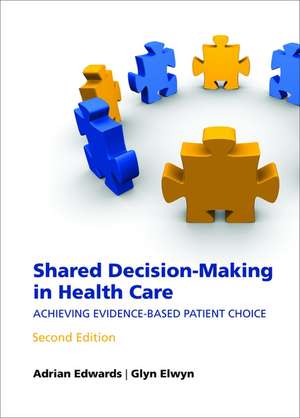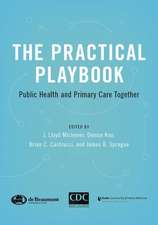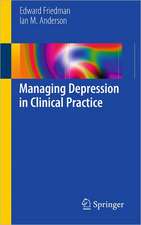Shared Decision-Making in Health Care: Achieving Evidence-Based Patient Choice
Editat de Adrian Edwards, Glyn Elwynen Limba Engleză Paperback – apr 2009
Preț: 353.62 lei
Preț vechi: 382.25 lei
-7% Nou
Puncte Express: 530
Preț estimativ în valută:
67.66€ • 70.90$ • 55.94£
67.66€ • 70.90$ • 55.94£
Carte tipărită la comandă
Livrare economică 10-16 aprilie
Preluare comenzi: 021 569.72.76
Specificații
ISBN-13: 9780199546275
ISBN-10: 0199546274
Pagini: 414
Ilustrații: 38 black and white line drawings, and 5 black and white photographs
Dimensiuni: 168 x 244 x 23 mm
Greutate: 0.7 kg
Ediția:2
Editura: Oxford University Press
Colecția OUP Oxford
Locul publicării:Oxford, United Kingdom
ISBN-10: 0199546274
Pagini: 414
Ilustrații: 38 black and white line drawings, and 5 black and white photographs
Dimensiuni: 168 x 244 x 23 mm
Greutate: 0.7 kg
Ediția:2
Editura: Oxford University Press
Colecția OUP Oxford
Locul publicării:Oxford, United Kingdom
Descriere
When the first edition of this book came out in 2001 (under the title Evidence-based Patient Choice: Inevitable or Impossible?), it examined the emerging themes of patient choice and clinical decision-making, and looked at how these might develop in the future. Since then, these issues have become even more topical. Evidence-based medicine is deeply ingrained in the practice of modern medicine, whilst patient choice is increasingly high on the political agenda. Butcan the two trends co-exist? 'Shared decision-making' has developed in response to the sometimes uneasy relationship between a patient's right to have input into their treatment options, and a clinician's responsibility to provide the best evidence-based health care.Imagine a patient with osteoarthritis of the knee. She and her doctor are considering whether she would benefit from surgery to replace her knee joint. This sort of decision is typical of many in health care where there is more than one reasonable alternative available to the patient and her doctor. These alternatives include surgery, physiotherapy, medication, complementary remedies, and more. What is right for one patient may be different from what is right for another. Clinical information(such as results of x-rays or even patient-reported symptom scores), though necessary, is not sufficient to determine the best treatment. Most importantly, each patient feels differently about the impact of the illness in their life and the importance of the potential good and bad outcomes of thetreatment options. In these situations, the best treatment is the one that reflects what is most important to patients who are well-informed about the options and potential outcomes. The shared decision-making approach helps doctors and patients to decide on the appropriate treatment.This timely book explores shared decision-making by examining from practical and theoretical perspectives what should be part of the decision-making process, what the benefits and potential difficulties are when it is attempted, and examples of how this is achieved in real health care practice for several health conditions. Finally, it also examines how this type of health care is likely to become more common place in the future.
Recenzii
Review from previous edition This well designed book is clear, accessible and, as one would expect from the title, evidence-based . . . I think this is a great book that challenges clinicians and others working in health care to develop and adapt to a rapidly changing and demanding world. Can we do it with support from patients? The answer is in the book!
Before the last chapter, evidence-based patient choice could still be an option. After it, there's simply no argument.
This impressive edited book . . . is truly excellent . . . essential reading for all those interested in patient involvement and evidence-based health-care.
Before the last chapter, evidence-based patient choice could still be an option. After it, there's simply no argument.
This impressive edited book . . . is truly excellent . . . essential reading for all those interested in patient involvement and evidence-based health-care.
Notă biografică
Glyn Elwyn is a primary care clinician who has research interests in shared decision-making, decision support technologies, risk communication and the integration of health informatics into clinical practice. He has published 150 peer-reviewed articles. He was appointed as one of the inter-school Link Chairs at Cardiff University in May 2005, and leads the Clinical Epidemiology Interdisciplinary Research Group at the School of Medicine (2007). In collaboration withProfessor Adrian Edwards, he convenes a research group on decision-making and the development of web-based interactive decision support materials (see www.prosdex.com, www.amniodex.com, www.bresdex.com). He is involved in the supervision of 10 PhD students. He holds a visiting chair position at 'IQ',the Scientific Institute for Quality of Healthcare, Radboud University & Medical Centre, Nijmegen, The Netherlands.He co-leads the International Patient Decision Aids Standards Collaboration with Professor Annette O'Connor, Ottawa, Canada.














